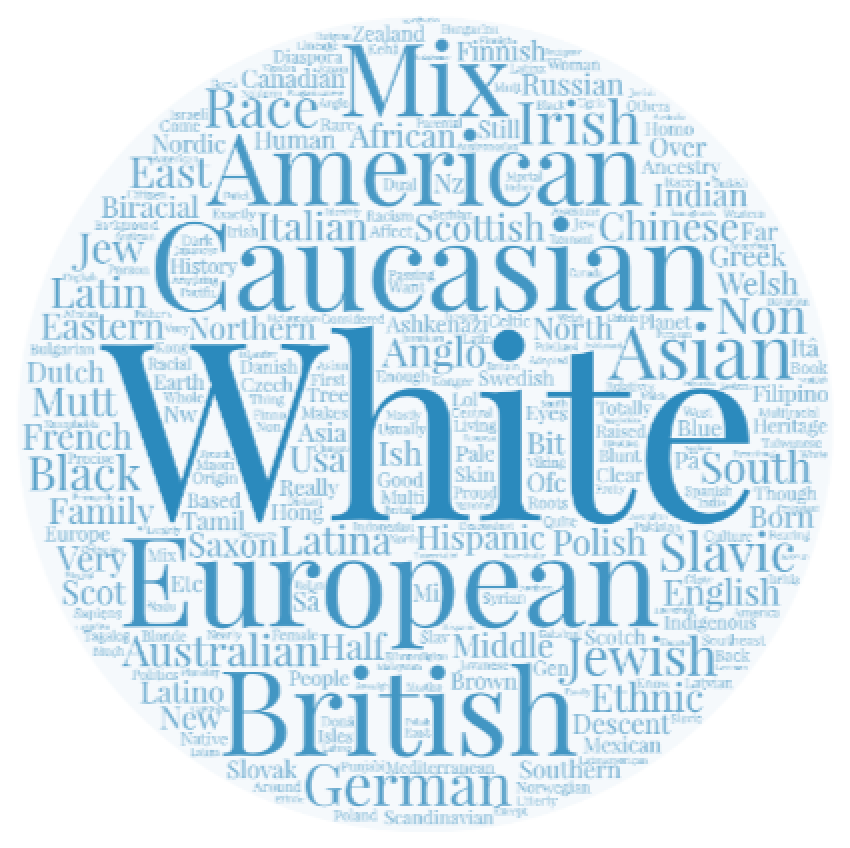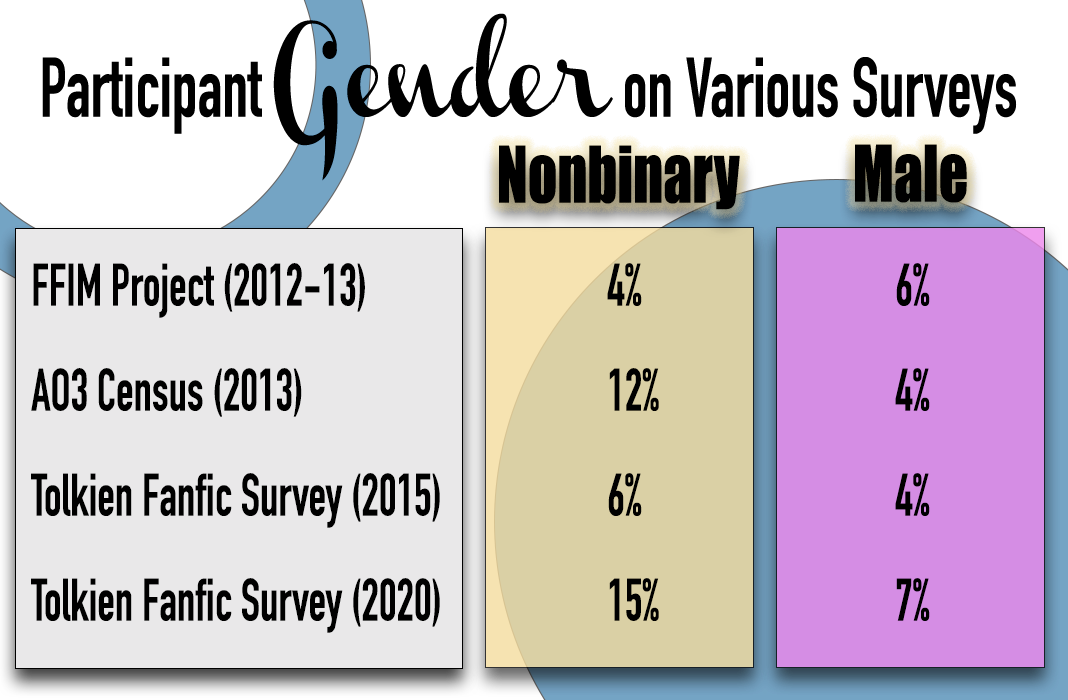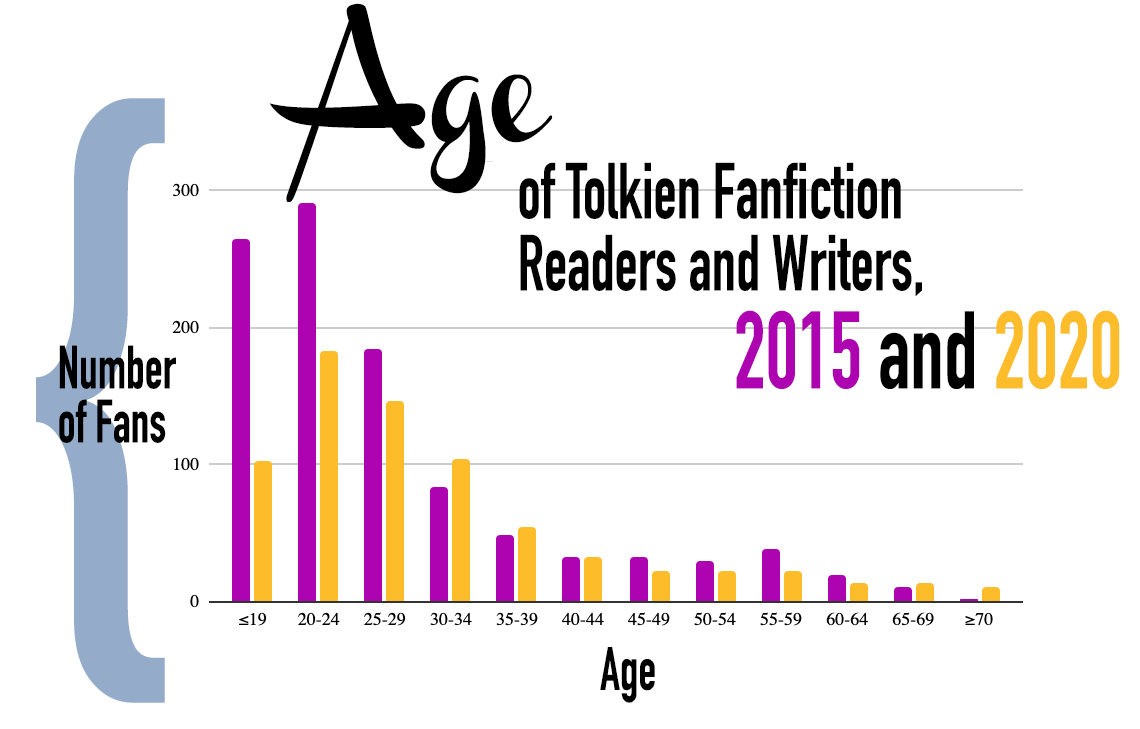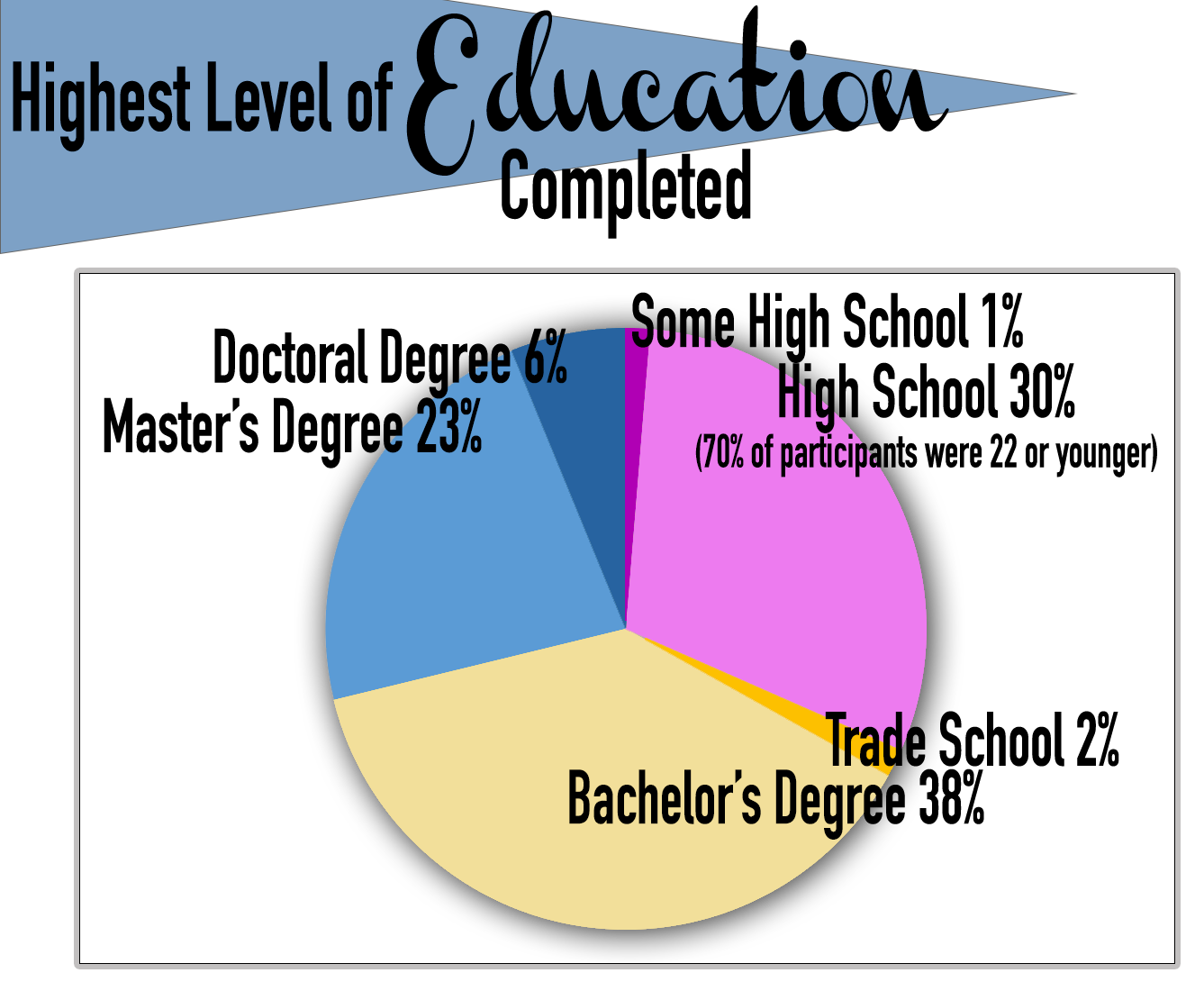Who Are We? Tolkien Fanfiction and Demographics by Dawn Walls-Thumma
Posted on 24 September 2022; updated on 24 September 2022
This article is part of the newsletter column Cultus Dispatches.
When you think of fans, who do you picture? Teens in exquisite cosplay at Comic-Con? Bare-chested middle-aged men screaming at a sporting event? Young women swapping fanfiction with their friends? A retiree whose collection of Broadway Playbills fill a three-inch binder to bursting?
While the word fan once had negative connotations—after all, it derives from the word fanatic, implying a lack of control and rationality—recent years have seen a reclamation of the word as a positive term, and most people today would probably describe themselves as a fan of something. But of course those billions of people do not sort themselves evenly or indiscriminately among fandoms, and who lands in any particular community makes for interesting data. And therein is the subject of this month's column: Tolkien fanfiction and who reads and writes it.
This column will look at demographic data from the Tolkien Fanfiction Surveys, which I first ran in 2015 and again in 2020 with the assistance of Maria Alberto. The two surveys had 1,052 and 746 valid responses, respectively. The 2015 survey collected some demographic data; the 2020 survey collected more. In each section, I will note any particular considerations or limitations in how the data should be interpreted.
However, I'll put here, up front, my usual disclaimer about survey data. As a researcher in quantitative humanities, I like to remind people that numbers give a false sense of security. They seem more precise and rigorous than some of the "mushier" qualitative approaches. In reality, precise or rigorous or not, they can only offer a single perspective of many. In the case of my survey, I could not reach every single person who wrote or ever wrote Tolkien-based fanfiction. Entire swaths of readers and writers became off-limits to me because I couldn't reach their communities in a way that allowed me to ask for their input on my survey. Other corners of the fandom were easier to reach and so are possibly overrepresented. So I do not take—and hope you will follow my lead in also not taking—any of these numbers as definitive statements on "The Fandom." A fandom as far-ranging and long-lived as ours can never be precisely quantified.
Gender
I don't remember when I first heard the statistic "90% of fanfiction is written by women." I heard it a lot, never with a citation (or with a vague handwave in the direction of Henry Jenkins if you want to name a fan studies scholar who might have said this—he didn't), much less any detail on the methodology used to arrive at this number. I kind of made it my mission to find out where this number came from, and the best I have been able to find is a reference in Camille Bacon-Smith's Enterprising Women to an article by Johana Cantor in a 1980 Star Trek fanzine that states that 90% of (presumably Trek) fanfiction is written by women.
But Cantor's number (if in fact it did originate with her) has proven remarkably accurate and stable over the years, through several iterations of surveys attempting to get at this very data. In 2003, Sasha Book in her Journal of Slash Research found nearly 100% of slash writers she surveyed were women. In the 2012-13 Fan Fiction and Internet Memory (FFIM) project by Abigail De Kosnik, 90% of the participants identified as female.1 Centrumlumina's 2013 AO3 Census found 80% of participants identified as female.
The Tolkien Fanfiction Survey follows suit—kind of. For both surveys, participants were allowed to self-describe in response to the question, "What is your gender?" I am defining "woman" for this question as any participant who used as term such as "woman" or "female" in their response, regardless of whether they identified as cisgender or transgender. In 2015, 89% of participants were women. Thirty-five years after Cantor stated this as true of Trek fanfiction writers, it holds steady in the Tolkien fanfiction community as well.
Until it didn't. Five years later, same question and same open-ended presentation, and only 73% of participants are women. What happened?
I think the answer lies in the smaller slice of the pie: the fans who don't identify as women. The data behind the statement that fanfiction is "women's writing" is so astounding that what is happening among fans who aren't women can be overlooked. The chart to the right shows the data for this group for four of the five surveys I'm discussing here; Book's Journal of Slash Research isn't included because she either didn't offer an option other than Female or Male, or no one chose it. (This is itself significant, I believe—see below!) Click any of the images in this article to see them full-sized.
What I see in this data is that the number of male fans remain fairly steady, with every survey within just a few percentage points of each other. The "loss" of women fans in 2020 was in fact a gain of nonbinary fans, not a sudden interest among men in writing Tolkien fanfiction. (And, to be clear, I am defining nonbinary in its broadest sense: literally anyone who identified otherwise than the Female-Male binary. This doesn't mean that all of these fans wrote "Nonbinary" as their gender identity [although most did], and my intent is not to erase those fans' preferred identity. However, the number of responses was so varied that the data makes no sense if broken down into its most granular form. Nonbinary, genderqueer, and agender fans, I would love to hear from you /silmarillionwritersguild/web/user/1/contact if you have a better way to both represent trends in the data and preserve the full range of identities among participants. As it is, you can find this information in the footnotes.2)
The data suggest that nonbinary identities are becoming more common in the Tolkien fanfiction fandom. This is possibly correlated with age, and younger fans for whom nonbinary identities are better understood and accepted as way to self-identify. I suspect this is why De Kosnik's data is so low: Her fifty participants in the FFIM project drew heavily from "acafans" who were older than fanfiction writers tend to be. The AO3 Census, given at about the same time, perhaps shows the opposite extreme: Young fans using AO3 rather than older platforms such as LiveJournal, Yahoo! Groups, or small single-fandom archives. Meanwhile, that the Journal of Slash Research didn't consider nonbinary identities probably reflects that, in 2003, these identities were extremely uncommon and not regularly discussed, even in the relatively more progressive Tolkien slashfic community.
Age
Fanfiction is often depicted as a young person's pursuit. Certainly, other datasets support that. In Book's Journal of Slash Research, 81% of participants were under the age of twenty-five. The mean age of participants in the AO3 Census was 25.1 (median 22-24) years with 62% of participants younger than twenty-five. Notably, the AO3 Census's final category was "50 or older" with only 1.4% of fans in that category. Even just a glance at De Kosnik's FFIM data shows that her participants were significantly older than most fanfiction writers, again, because she drew heavily from acafans and other experienced fans in putting together the project.3
Tolkien Fanfiction Survey data suggests that the Tolkien fanfiction community is older than fanfiction writers more generally, at least using the AO3 Census as a guide. Here, too, it is important to note a change in methodology between the 2015 and 2020 surveys. In 2015, the Institutional Review Board (IRB) that approved the use of human subjects in my research did not require age verification, so responses from minors were collected. In 2020, the IRB did not allow the collection of data from anyone under the age of eighteen. Participants were asked to verify their age, and any responses from participants under eighteen were discarded. As a result, 2020 data will skew older due to the absence of any responses from fans under eighteen. (In 2015, this was 20% of fans, so not insignificant.)
All the same, both data sets show that fans are not only older on average, but Tolkien-based fanfiction is written and read by older fans more often than in other fandoms (at least on AO3). In 2015, the mean age was twenty-eight, and the median was twenty-four years. In 2020, the mean age was thirty-one and the median twenty-seven years—again noting the 2020 data would skew older.
What is notable too, though, for both sets is the number of older fans. In 2015, 10% of participants fell into the category of "50 or older"; in 2020, it was 11%. This shows that fans don't simply write Tolkien-based fanfiction longer into the young adulthood than in other fandoms but fans join and remain in the fandom at all life stages, a phenomenon suggested by the AO3 Census data to be relatively uncommon on that site.
Race, Ethnicity, and Language
In the 2020 survey, Maria and I wished to expand the demographic data that we collected. First, we asked about language ("Is English your first language?"). This data is relatively straightforward: 69% of participants spoke English as their first language. Put another way, however, this means that about one in three fanfiction writers from the communities surveyed does not speak English as their first language.
Some caution is urged here: I suspect the Tolkien fanfiction fandom is much more language-diverse than suggested here. Again, some communities were easier to reach than others, and as far as I know, the survey wasn't promoted at all in communities where the primary language wasn't English. And we know these exist: There is considerable fanfiction produced by German, Russian, and Chinese fans, to name just three, in their native languages. The survey itself was in English, excluding any fans for whom English isn't a language with which they were comfortable.
We also asked about race and ethnicity. This was a tricky question. Maria and I are both from the United States, with an understanding of race and ethnicity rooted in that country's history and culture, where race plays a significant, painful, and omnipresent role. We debated at length the best way to word the question and the answer choices to capture the data we wanted. As we discussed the issue we faced with fans from countries outside the U.S., it became clear that there were no easy solutions. Terms like "person of color" or "BIPOC" that we, as U.S. academics, relied on didn't have meaning in other places in the world. Furthermore, outside the U.S., identity didn't necessarily center on race—meaning skin color and physical features—in the same way that it did here. We realized that we might be missing out on important identifiers by focusing so tightly on a U.S. construction when asking fans outside the U.S. to describe themselves.
So we settled on a free-response field that allowed fans to answer the question, "How would you describe your race or ethnicity?" in whatever way they preferred. The results, therefore, are messy and imperfect—but I do like to think they're less imperfect than if we had forced an international fandom into a U.S. mold on this question.
And they do allow us to see some trends. Below is a word cloud of all of the responses to this survey item, created for and presented at the Tolkien Society's 2021 seminar on Tolkien and diversity. This shows a visual representation of the words fans used to identify themselves most often without excluding any response from the survey.

First of all, the fandom is overwhelmingly White. 71% of fans used a word like white or Causasian in their response. In some cases, participants also included a national origin (e.g., "white English") or ethnicity (e.g., "white Latina"). However, the big takeaway here is that at least 71% of fans surveyed are White.
As far as national origin, 31% identified a European national origin (e.g. "Irish") or ancestry (e.g., "Irish-American"), and 9% identified as American, which I use here in the broadest sense of the word, including more than just the United States but also Canada, Mexico, Central America, South America, and the Caribbean.
Finally, 13% of participants identified in such a way that would be considered Black, Indigenous, or Person of Color (BIPOC) in the U.S. I realize that it's perhaps counterintuitive (even hypocritical?) to resist U.S. definitions of race and ethnicity up to the point that people provide responses, then shoehorn responses into U.S. definitions of race and ethnicity anyway. However, the fact remains that the Tolkien fanfiction community—at least the part sampled by this survey—remains overwhelmingly White and Western. Fans of color have described again and again experiences of bias, exclusion, and outright bigotry in the Tolkien fandom (including the fanfiction community) that reflect this White, Western context.
My biggest takeaway here is that there are a whole lot of missing BIPOC fans. Whether it is the source texts or the fandom or both, something is causing BIPOC fans to self-select away or out of the Tolkien fanfiction community. In a fandom that has become a haven for women and LGBTQ+ writers—groups who have historically found little support and traction in the publishing world—that same sense of safety and welcome seems not to have been extended to BIPOC fans.
Education
Another question introduced in 2020 asked, "What is the highest degree or level of education you have completed?" The results show that people who read and write Tolkien-based fanfiction have generally completed education at the university level or beyond. The graph to the right shows the results for this question for participants who chose to respond, but the big takeaway here is that two out of three fans had completed university degrees.
Important to keep in mind here too is that education is impacted by age, and although evidence suggests that Tolkien fanfiction participants tend to be older than writers and readers of fanfiction in general, the majority of fans are still young. Among the participants who selected their highest level of education as "Some High School" or "High School," 70% of them were twenty-two years old or younger, meaning they likely hadn't had a chance to complete a university degree yet and very well could have been in a university program when they responded to the survey.
The Tolkien fanfiction fandom is both praised and criticized for what many perceive as an academic inclination. It is what attracts many fans to the fandom and, I suspect, what causes so many fans to remain in the fandom for years or even decades: In addition to the plentiful (and difficult) material available in the canon, there is endless ongoing discussion, interpretation, and reinterpretation of that material, often through a scholarly lens, available to fans who enjoy that kind of interaction.
But other fans report the opposite. Enjoyment of or preference for an intellectual style of engagement is not inherently superior, and this aspect of the fandom can be off-putting for fans whose preferences lie elsewhere. Some fans report that the fandom's scholarly bent makes it feel intimidating when they have not had the advanced academic training that much of the fandom has had. It introduces the question of how the fandom can better welcome fans and value the contributions of fans who do not have advanced academic training.
Religion
In 2020, Maria and I also asked about religion. Other multifandom surveys (like the AO3 Census on De Kosnik's FFIM project) did not include religion, possibly because religion plays an outsized role in the Tolkien fandom in a way that it does not in other fandoms. Throughout the fandom's history, Tolkien's Catholicism has been weaponized against fans who offer interpretations of the texts that do not foreground Christianity and especially against fans who create fanworks perceived as contrary to "Christian" (in fact, deeply socially conservative) values. At the same time, fans belonging to minority religions—Paganism is one that comes immediately to mind—have also found spiritual connections in Tolkien's works. Because of this history, Maria and I wished to gain a clearer picture of the religious backgrounds of the fans we were surveying. We asked, "How would you describe your religious or spiritual beliefs? (you can answer in as much or as little detail as you like)," and as with most of the demographic items, allowed participants to freely respond.
Christians were the largest group in our data, but atheists were not far behind, with 25% and 21% of participants, respectively. Agnostics form the next largest group, with 19% of participants. Additionally, 10% of participants responded "None," which we counted separately but who may in fact align themselves with atheistic or agnostic beliefs.
This introduces an interesting fact: Despite the attention paid to Tolkien's religion and the outsized role that conservative Christian fans have played in the fandom's history, just over half of fans who responded to the survey do not identify a religion. Their numbers are double that of Christian fans.
Within the remaining 25% of fans, religious identification is diverse. The next three most common religions identifications are Pagan, Spiritual, and Jewish, each with roughly 5% of participants. Beyond that, all major world religions were represented—Hinduism, Buddhism, and Islam—and then some.
These data certainly help make sense of the last twenty years of Tolkien fanfiction history. Early on, socially conservative beliefs often prevailed, with sexist and homophobic ideas not only tolerated but often codified into group policies, such as bans on slash fiction. That these beliefs and policies swiftly evaporated is likely explained by the fact that the fandom was—or at least became—largely secular and, among religious fans, highly diverse.
Conclusion
Returning to the original question, when you picture a Tolkien fanfiction writer, whom do you picture?
According to survey data, she is likely in her twenties, White and Western with English as her first language, and identifies as a woman. She is probably atheist or agnostic, and she likely has a university degree (or is working on one).
It is worth remembering, too, the fans not pictured by the data: fans of color, older fans, fans who don't pursue university educations, fans who don't speak English as their first language, and fans from religious minorities. As I noted above, these fans are "missing" from the data and from the fandom.
In some cases, it may be that these fans have separate communities that we were unable to reach with the survey, such as the many vibrant fandom spaces in languages other than English. In other cases, the fandom may be (or at least feel) hostile towards some groups, who find that they cannot safely or comfortably participate in the fandom at all. BIPOC fans and fans without university educations are two groups who have articulated that they feel unwelcome in most Tolkien fanfiction spaces. In other cases, we simply don't know why a group is missing from the fandom. For example, Hindus make up 15% of the world's population but among the 746 people who took the survey, only two were Hindu. Is their absence a matter of language? Race and color? That these fans are participating in fandoms for their own rich cultural and media products (largely inaccessible or ignored by the Western world) and don't "need" Tolkien too? Or is it another factor entirely? Regardless, a dive into demographics, to me, opens questions of who the fandom is designed to serve and invites the question: How might the fandom look different? And how does that change who shows up?
Works Cited
- Abigail De Kosnik, Rogue Archives: Digital Cultural Memory and Media Fandom (Cambridge: MIT Press, 2016), 350.
- A breakdown of the data included in the general term "nonbinary" used here for simplicity's sake (data in parentheses is the number of participants in the 2020 survey who identified in this way): Nonbinary (111), Agender (5), Demigirl (2), Genderqueer (4), Genderfluid (4), and Questioning (2). Six participants indicated they were trans men and were included in the "male" category. I also want to mention my favorite response of all, which I ended up counting in the "no response" category: "gender is a fake social construct."
- De Kosnik, Rogue Archives, 350.





Writers and readers of colour
Interesting. I would like to hope that there were more writers of colour or mixed race in the fandom, or at least that there will be. Many of the fanworks on SWG and AO3 are colour-blind or sensitive, as are some pieces of fan artwork. Hopefully the world and fandom continue to evolve.
an AOMB reader rather than writer.... (my UK ethnicity of "Mixed - any other mixed background")
It is really important that…
It is really important that Tolkien fans should be as welcoming as possible to anyone who has an interest, wherever they are coming from (especially given the frightening use that is also being made of his works by some people in other quarters).
Although I think it is also possible to flummox newcomers quite innocently, while nerding out over Numenorean dancing bears or whatever, because we have those unusually obscure bits of quasi-canon.
And as a fan, it is also so easy to forget that there are many people who are just not interested in Tolkien, regardless, for very good reasons of their own!